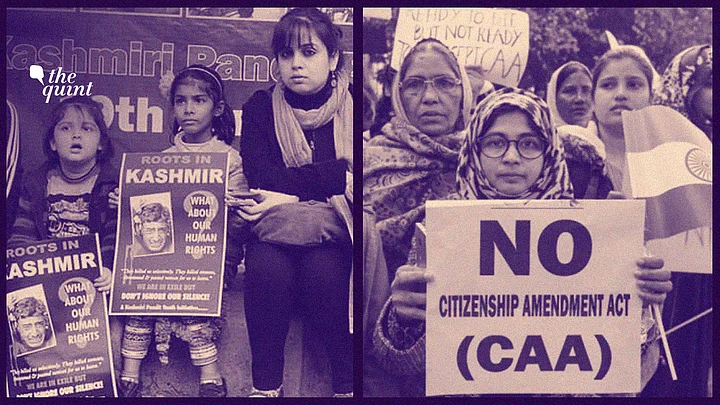Thirty years ago, on this day, Kashmiri Pandits, including my family members, were driven out of the valley of Kashmir by militant Islamic separatists. Not even the great seers of our past would have been able to foresee the consequence of this horrible set of events.
The Pandits, abandoned first by a Congress union government, and then by a BJP-supported National Front government, were reduced to refugees in their own country.
A prosperous, proud people reduced to ordinary refugees in makeshift shanties and camps. Over 30 long, painful years we rebuilt our lives in metropolitan cities across the country.
We slowly mutated into an atomic sociopolitical anomaly: A persecuted Hindu minority from a majority Muslim state, within a Hindu majority country.
A damning validation of all the fears that Hindutva had been peddling for decades.
Thirty years later, the trauma vividly lives on. It is reinforced in drawing rooms by authentic inter-generational tales of fear and inauthentic, meaningless rants on national television. The former is remembrance, the latter generally an excuse for someone else's persecution.
‘Our Story Used to Polarise Nation’
First, the doves abandoned us and now the hawks have co-opted us. Over time, Kashmiri Pandits have become the rallying cry of the Hindu Right. Our story is used to polarise a nation. 'What about the Kashmiri Pandits?', cries a 38-year-old man, while protesting my protestation of a 19-year-old's lynching, without recognising my last name.
What about us? Whether we believe it or not, our dream has passed. There is no going back, especially not now.
An entire generation of Kashmiri Muslims is growing up with utter hatred for an authoritarian Indian State, while traumatised, and now hyper-nationalised, Kashmiri Pandits are growing delirious with veneration for that very same regime.
There is no reconciliation possible. Not between communities that deny each other's reality. For Muslims, as life becomes crueller, it becomes harder and harder to think of someone else's suffering three decades ago.For Pandits, time stopped 30 years ago, and everything else is just frosting. We (Pandits) have also regressed as people. We were people of knowledge and nuance who produced scholars and leaders; we were the children of India's proto-democrat, Pandit Nehru.
‘We’ve Become Simpler, Angrier People’
Starved of our heritage, we have regressed to becoming simpler, angrier people. Having to rebuild our lives in cubicles has shrunken our sense of self. We care less about the world, more about our own grievances.
We ask fewer questions and are more willing to follow displays of strength that make us feel safe. Complex narratives scare us.
We have become poster-children of an undemocratic gasbag who publicly attacks, at every occasion, that which we built our history on – scholarship. Every day, I dream that we can build the kind of solidarity that can help my community see that the women at Shaheen Bagh are fighting the same evil that afflicted us 30 years ago.
It just uses different names and comes in different colours. Every day, I hope that we can reverse one of the greatest failures of the Indian Liberal-Left establishment: Losing the moral courage to speak loudly and clearly for those who needed their aid.
(Rishi Razdan works in international development. He has formerly been an Entrepreneur, Management Consultant and Fellow with the University of Chicago. This is a blog and the views expressed above are the author’s own. The Quint neither endorses nor is responsible for the same).
